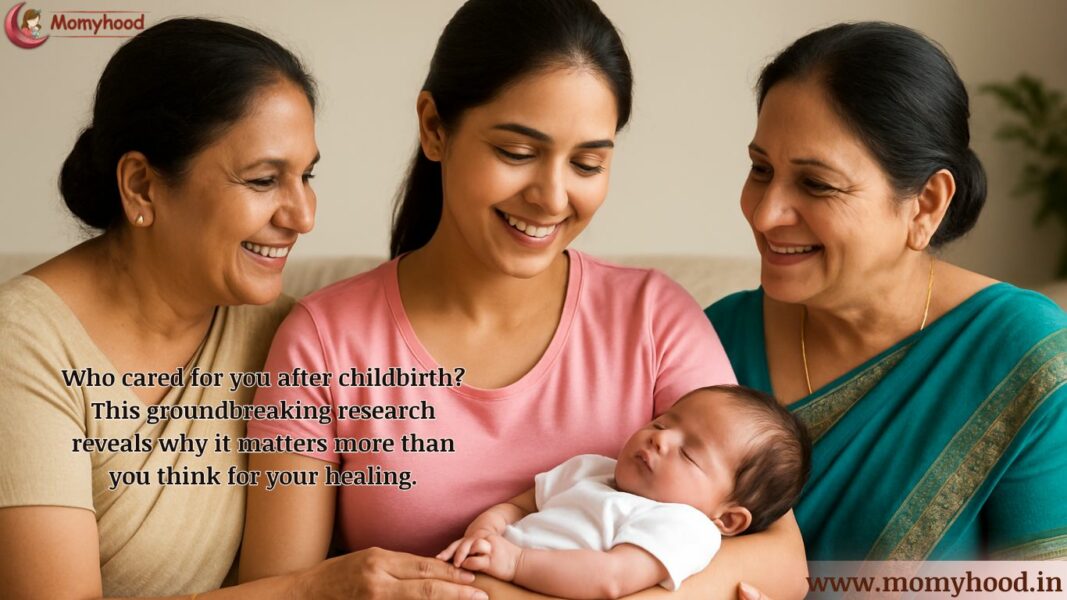The moment you hold your baby for the first time, everything changes. But what happens next – during those fragile weeks of recovery – can shape your entire motherhood journey. Postpartum care isn’t just about healing from childbirth; it’s about feeling supported, understood, and empowered during one of life’s most vulnerable transitions.
A groundbreaking international study has revealed something that might surprise you: the person who cares for you after delivery significantly impacts your recovery. The research findings are eye-opening, but more importantly, they validate what many new mothers have quietly felt but couldn’t express.
The Study That’s Changing How We View Postpartum Care
Researchers from the University of California, Noora Health, and USAID Innovation Foundation conducted an extensive study involving over 18,000 women across India between 2018-2020. What they discovered about postpartum care dynamics will resonate with mothers worldwide.
The study found that new mothers who received care from their own mothers showed significantly better recovery outcomes. However, when mother-in-laws provided primary care, recovery rates decreased by an average of 16%.
But here’s what the numbers don’t tell you – the emotional story behind every statistic.
Why Your Recovery Depends on More Than Medical Care
Postpartum care extends far beyond checking your stitches or monitoring your bleeding. It’s about having someone who:
- Listens to your fears without judgment
- Respects your instincts about your own body and baby
- Supports your choices rather than imposing traditions
- Understands your emotional needs during this vulnerable time
Sarah, a first-time mother from Mumbai, shared: “When my mother cared for me, she would ask how I was feeling before telling me what to do. When my mother-in-law took over, every decision about my baby and my body was made for me. I felt invisible in my own recovery.”
📣 Loved what you read? Want to go deeper into conscious parenting? ✨ The Power of Manifestation in Parenting is now available — A soulful guide packed with real-life tools like affirmations, energy shifts, and sleep talk that I personally use with my son, Hitarth. 💛 Start your journey toward calmer, connected parenting today. 🎉 Launch Offer: Only ₹99 (limited-time price!) 📲 Instant download. No waiting. 👉 Grab your copy now!.
Also read: My Postpartum Depression Recovery: 7 Practical Steps That Actually Worked
The Hidden Truth About Decision-Making in Postpartum Care
The research revealed a startling reality: only 33% of new mothers were consulted about care decisions regarding themselves and their babies. Two-thirds had decisions imposed on them without consultation.
This isn’t just about cultural dynamics – it’s about basic human dignity during one of your most vulnerable moments.
The emotional impact is profound:
- Loss of autonomy over your own body
- Decreased confidence in your mothering abilities
- Increased anxiety about your recovery
- Feelings of helplessness and frustration
Understanding the Mother vs. Mother-in-Law Dynamic
When Your Mother Provides Postpartum Care:
- Natural communication flow: She’s more likely to understand your unspoken needs
- Emotional safety: You can express vulnerability without fear of judgment
- Flexible approach: More willing to adapt traditions to your preferences
- Advocacy: Acts as your voice when you’re too exhausted to speak up
When Your Mother-in-Law Provides Care:
- Traditional expectations: May prioritize established customs over individual needs
- Generational differences: Different philosophies about new mother care
- Family dynamics: Navigating relationships while recovering
- Communication barriers: Harder to express disagreement or discomfort
This isn’t about labeling mother-in-laws as “bad” – many provide excellent care. It’s about understanding the dynamics that affect your maternal recovery.
The Science Behind Emotional Support in Recovery
Postpartum care that includes emotional validation triggers several physiological benefits:
- Reduced cortisol levels: Lower stress hormones promote faster healing
- Better sleep quality: Feeling safe and supported improves rest
- Increased oxytocin: The “bonding hormone” aids physical recovery
- Enhanced immune function: Less stress means better infection resistance
Dr. Maya Patel, a maternal health specialist, explains: “When a new mother feels heard and supported, her body literally heals faster. Postpartum care that ignores emotional needs is incomplete care.”
Red Flags: When Postpartum Care Becomes Harmful
Watch for these warning signs that your postpartum support may be hindering rather than helping:
Decision-making control:
- Your preferences about feeding, sleeping, or baby care are consistently overruled
- You’re told “you don’t know what’s best” for your own body or baby
- Traditional practices are enforced without considering your comfort
Emotional invalidation:
- Your concerns are dismissed as “hormonal” or “dramatic”
- You’re made to feel guilty for not appreciating help
- Your instincts about your baby are questioned constantly
Physical boundaries ignored:
- Rest time is interrupted for non-essential tasks
- Your privacy during recovery is not respected
- You’re pressured to resume normal activities too quickly
Creating Better Postpartum Care: What Really Works
For New Mothers:
Communicate your needs clearly: “I need to make the final decisions about my body and my baby, even if I ask for advice.”
Set boundaries early: “I appreciate help, but I need you to check with me before making changes to the baby’s routine.”
Ask for emotional support: “I need someone to listen to my worries without immediately trying to fix them.”
For Caregivers (Mothers and Mother-in-Laws):
Ask before acting: “What would be most helpful for you right now?”
Validate feelings: “It’s normal to feel overwhelmed. What you’re experiencing is valid.”
Respect autonomy: “You’re the mother. I’m here to support your choices.”
Related read: Postpartum care: 8 things every new mom should know, from emotional recovery to breastfeeding, more
Building Your Postpartum Support Network
The best postpartum care often comes from a team approach:
Primary caregiver (mother, mother-in-law, or partner): Provides daily physical support Emotional support person: Someone who listens without judgment Practical help: People who handle household tasks without taking over baby care Professional guidance: Healthcare providers for medical concerns
When to Seek Additional Help
Sometimes family postpartum care, regardless of who provides it, isn’t enough. Seek professional support if you experience:
- Persistent sadness or anxiety beyond the “baby blues”
- Difficulty bonding with your baby
- Overwhelming feelings of inadequacy
- Physical symptoms that aren’t improving
- Thoughts of harming yourself or your baby
The Bottom Line: Quality Over Relationship
The research doesn’t suggest that mothers-in-law can’t provide excellent postpartum care – many do. Instead, it highlights what makes care effective:
Emotional attunement over rigid traditions Collaborative decision-making over imposed choices
Individual needs over one-size-fits-all approaches Your voice at the center of your own recovery
Moving Forward: Redefining Postpartum Care
As we understand more about maternal recovery, it’s clear that quality postpartum care must evolve. It’s not enough to focus solely on physical healing – emotional wellbeing is equally crucial.
Whether your mother, mother-in-law, partner, or hired help provides your care, the principles remain the same: respect, communication, and putting your needs at the center of your recovery.
Remember, advocating for better postpartum support isn’t selfish – it’s essential. When mothers recover well, families thrive. When you heal completely – physically and emotionally – you’re better equipped to care for your baby and enjoy the journey of motherhood.
Your recovery matters. Your voice matters. And you deserve postpartum care that honors both your vulnerability and your strength during this transformative time.
If you’re struggling with postpartum recovery or need additional support, don’t hesitate to reach out to healthcare providers, mental health professionals, or postpartum support organizations in your area. You’re not alone in this journey.
Your comments and shares do more than just support our blog—they uplift the amazing moms who share their stories here. Please scroll down to the end of the page to leave your thoughts, and use the buttons just below this line to share. Your support makes a big difference!



